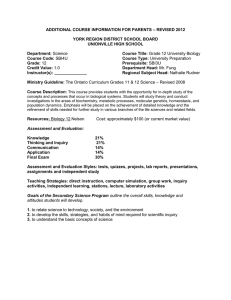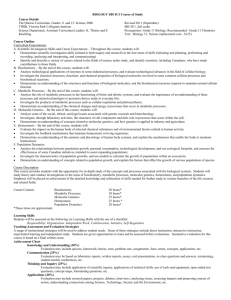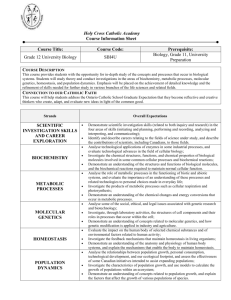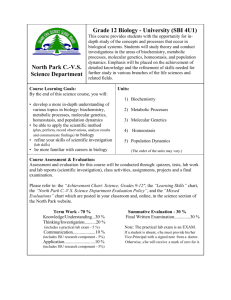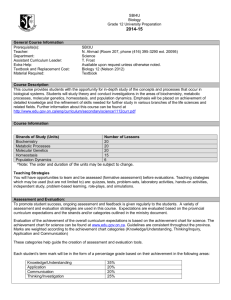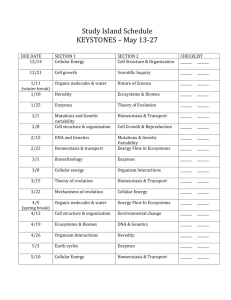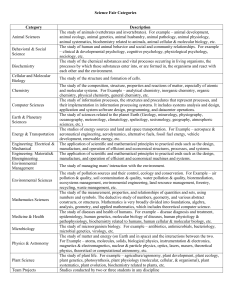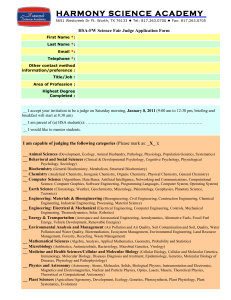Biology, Grade 12, University Preparation
advertisement
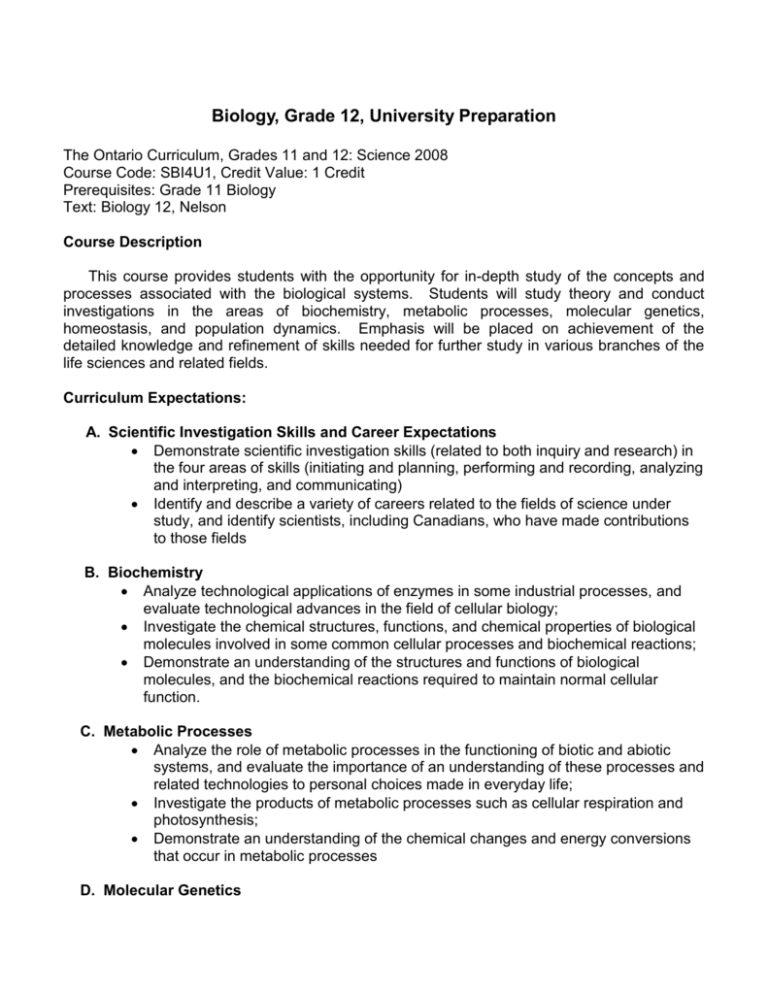
Biology, Grade 12, University Preparation The Ontario Curriculum, Grades 11 and 12: Science 2008 Course Code: SBI4U1, Credit Value: 1 Credit Prerequisites: Grade 11 Biology Text: Biology 12, Nelson Course Description This course provides students with the opportunity for in-depth study of the concepts and processes associated with the biological systems. Students will study theory and conduct investigations in the areas of biochemistry, metabolic processes, molecular genetics, homeostasis, and population dynamics. Emphasis will be placed on achievement of the detailed knowledge and refinement of skills needed for further study in various branches of the life sciences and related fields. Curriculum Expectations: A. Scientific Investigation Skills and Career Expectations Demonstrate scientific investigation skills (related to both inquiry and research) in the four areas of skills (initiating and planning, performing and recording, analyzing and interpreting, and communicating) Identify and describe a variety of careers related to the fields of science under study, and identify scientists, including Canadians, who have made contributions to those fields B. Biochemistry Analyze technological applications of enzymes in some industrial processes, and evaluate technological advances in the field of cellular biology; Investigate the chemical structures, functions, and chemical properties of biological molecules involved in some common cellular processes and biochemical reactions; Demonstrate an understanding of the structures and functions of biological molecules, and the biochemical reactions required to maintain normal cellular function. C. Metabolic Processes Analyze the role of metabolic processes in the functioning of biotic and abiotic systems, and evaluate the importance of an understanding of these processes and related technologies to personal choices made in everyday life; Investigate the products of metabolic processes such as cellular respiration and photosynthesis; Demonstrate an understanding of the chemical changes and energy conversions that occur in metabolic processes D. Molecular Genetics Analyze some of the social, ethical, and legal issues associated with genetic research and biotechnology; Investigate, through laboratory activities, the structures of cell components and their role in processes that occur within the cell; Demonstrate an understanding of concepts related to molecular genetics, and how genetics is applied in industry and agriculture. E. Homeostasis Evaluate the impact on the human body of selected chemical substances and of environmental factors related to human activity; Investigate the feedback mechanisms that maintain homeostasis in living organisms; Demonstrate an understanding of the anatomy and physiology of human body systems, and explain the mechanisms that enable the body to maintain homeostasis. F. Population Dynamics Analyse the relationships between population growth, personal consumption, technological development, and our ecological footprint, and assesses the effectiveness of some Canadian initiatives intended to assist expanding populations; Investigate the characteristics of population growths, and use models to calculate the growth of populations within an ecosystem; Demonstrate an understanding of concepts related to population growth, and explain the factors that affect the growth of various populations of species Course Content: Biochemistry Metabolic Processes Molecular Genetics Homeostasis Population Dynamics 20 hours* 20 hours* 25 hours* 25 hours * 20 hours* *These times are approximate. Learning Skills Students will be assessed on the following six Learning Skills with the use of a checklist: Responsibility, Organization, Independent Work, Collaboration, Initiative, Self-Regulation Teaching/Assessment and Evaluation Strategies A range of instructional strategies will be used to address student needs. Some of these strategies include direct instruction, interactive instruction, experiential learning and independent study. Students are given opportunities to learn and be assessed before evaluations. Summative evaluation for this course is based on a final written exam. Achievement Chart Knowledge and Understanding (30%) Evaluation may include quizzes, homework checks, tests, problem sets, assignments, facts, terms, concepts, applications, etc. Communication (25%) Evaluation may be based on laboratory reports, written reports, essays, oral presentations, in-class questions and answers, terminology, student-teacher conferences, etc. Thinking and Inquiry (25%) Evaluation may include application of scientific inquiry, applications of technical skills, use of tools and equipment, open ended test questions, concept maps, formulating questions, etc. Applications (20%) Evaluation may include research papers, projects, debates, interviews, analyzing issues, assessing impacts and proposing courses of action, understanding connections among Science, Technology, Society and the Environment, etc. 70% Grade on Course Work** Biochemistry Task Technological Application of Biochemistry Biochemistry Quiz Biochemistry Inquiry Unit Test Achievement Chart Focus K&U T/I C A X X X X X X X X X Time of Assessment X X Metabolic Processes Task Role of Metabolic Processes Assignment Cellular Respiration Quiz Cell Energetics Inquiry Photosynthesis Quiz Unit Test Achievement Chart Focus K&U T/I C A X X X X X X X X X X X X X Time of Assessment Molecular Genetics Task Achievement Chart Focus K&U T/I C A Time of Assessment Genetic Research and Biotechnology Issues Assignment DNA Replication Quiz Molecular Genetics Inquiry Protein Synthesis Quiz Unit Test X X X X X X X X X X X X X Homeostasis Task Impact of chemical/environmental factors on homeostasis Assignment Renal Physiology Quiz Homeostasis Inquiry Nervous/Endocrine Quiz Unit Test Achievement Chart Focus K&U T/I C A X X X X X X X X X X X X X Time of Assessment Population Dynamics Task Global Ecological Issues and Canadian initiatives Assignment Population Growth Inquiry Unit Test ** Above tasks subject to minor changes. Achievement Chart Focus K&U T/I C A X X X X X X X X X X X Time of Assessment 30% Grade Based on Course-Culminating Activities All students will write a final exam. The Research Process: For every research-based assignment, students will be expected to use the TDSB student research guide, Research @ Your Library with the 4 stage model of the research process incorporated into these assignments either in part or in whole. Students will receive instruction and be assessed / evaluated on various aspects of the research process by either their teacher or one of the teacher-librarians. These lessons may include, but are not limited to the development of research questions, note-taking, adherence to a specific documentation style, facility with a variety of resources, etc. Accommodations Accommodations refer to the teaching strategies, supports, and/or services that are required in order for a student to access the curriculum and demonstrate learning. Students who have an IEP are entitled to the accommodations specified in their plans. Term Grades for Provincial Reports throughout the Year The grade for each term/reporting period is based on the evaluations that have been conducted to that point in the course, and will be preliminary and tentative. They will be based on the most consistent level of achievement to that time, but some of the overall expectations, strands, end units, will not have been addressed. The students’ grades may change when all work is evaluated by the end of the course. Midterm reports will be sent home with the students approximately half way through the semester.
